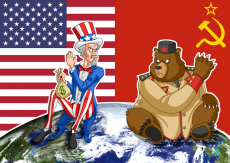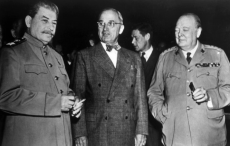
Email: ZYVC057@live.rhul.ac.uk
Total Article : 213
About Me:I'm a graduate student studying International Criminal Law and first started writing for King's News almost 4 years ago! My hobbies include reading, travelling and charity work. I cover many categories but my favourite articles to write are about mysteries of the ancient world, interesting places to visit, the Italian language and animals!

Over a Century before the Cold War broke out, in 1835, the French scholar Alexis de Toqueville commented that "there are now two great nations in the world, which starting from different points seem to be advancing toward the same goal: the Russians and the Anglo-Americans.. Each seems called by some secret design of Providence one day to hold in its hands the destinies of half the world". Little did de Toquelle know at the time that his worst fears when observing American democracy were to come true and, what is worse, the two super powers he envisioned would come to built a Pompeii-like vulcano, a ticking time bomb, waiting to errupt.
King's News has already published some articles on the cold war, analysing what caused it and why it couldn't be prevented, so with this series of articles I aim to provide a time-line of events whilst giving a general overview of the critical years which characterised the Cold War from 1945 to 1990. Personally, I think that in order to understand what the term "Cold War" actually means and when it came about we should go back in time to the end of Word War Two. Just two months after Germany had agreed to surrender, on July 25th 1945, the fate of the nation was discussed at Potsdam in a meeting controlled largely by the "big three" politicians which emerged from the war: British Prime Minister Winston Chruchill, Soviet Union leader Joseph Stalin abd US President Harry Truman. Whereas Stalin was at his prime, having led the Soviet Union for almost twenty years, Truman had only been President for three months. Tentions flared as the three discussed the important issue of reparations; Stalin was keen to rebuild Germany once again whereas Truman feared that the US would be paying to reform Germany and therefore would be helping the Soviet Union grow too. After long, tedious talks the politicians present at Posdam agreed to simply section Germany off into four areas, each controlled by either Britain, France, the US or the Soviet Union. Just like when African nations gained dependece and Westerners drew the borders of each nation on maps without taking into account the natural geographical and ethnic divisions of the countries, the sectioning of Germany was a pretty hasty decision. The West (France, Britain and the US went on to occupying the Germany west of Berlin and the Soviet Union dominated the East.

During the Posdam meeting, each politician had one big question on their mind: who would control Europe now? Of course, this was never fully discussed but tensions were running high as each member of the meeting began to imagine a future in which their nation would preside over European affairs. Ironically, nobody actually every asked themselves why Europe had to be "controlled" by someone in the first place but, as history repeatedly tells us, the thirst for power is man's weakness. When thinking about the Posdam meeting, I imagine lots of men with smart suits sitting at a table trying to rebuild European socities after the dreadful war. Throughout the meeting I envision heads either shaking furiously or nodding fervently depending on what was being said and whether they agreed. As each person began to think about who would dominate Europe two men's eyes in particular would begin to gleam at the thought, Stalin's and Truman's, as they sat there wracking their mind for a way to ensure they benefitted the most from the meeting.
Image 1: http://aboutthecoldwar.weebly.com/uploads/2/0/3/4/20346417/536884299_orig.jpg
Image 2: http://images.fineartamerica.com/images-medium-large/the-potsdam-conference-joseph-stalin-everett.jpg

0 Comment:
Be the first one to comment on this article.